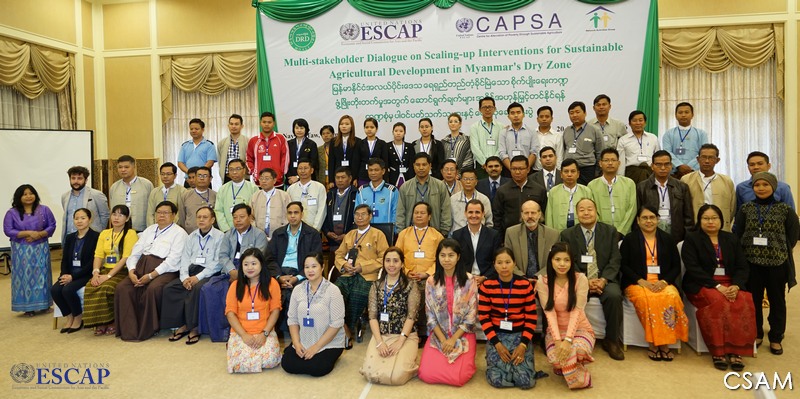UN-backed dialogue calls for scaling-up successful technical and policy interventions for sustainable agricultural development in Myanmar’s Dry Zone

Opportunities for expanding successful technical and policy interventions towards achieving more rapid and sustainable development of the agriculture sector in Myanmar’s Dry Zone were highlighted at a dialogue here this week, participated by national and provincial policy makers, academics, civil society representatives, private sector experts and development practitioners.
Mr. Khant Zaw, Director General, Department of Rural Development, Ministry of Agriculture, Livestock and Irrigation (MoALI) in his opening remarks stated that “Myanmar’s Dry Zone has peculiar local characteristics that require special interventions to face the challenges and to improve practices in sustainable agriculture. This dialogue seeks to make recommendations to senior levels of government to be incorporated in Myanmar’s policies.”
“To achieve broad-based and sustained impact, it is important to have multi-stakeholder knowledge networks which can enable effective exchange of knowledge not just in Myanmar but within the Asia-Pacific region as a whole,” noted Mr. Masakazu Ichimura, Director of the Centre for Alleviation of Poverty through Sustainable Agriculture (CAPSA) of the United Nations Economic and Social Commission for Asia and the Pacific (ESCAP).
“Scaling-up and sustainability are important and in fact essential topic in any developing country context. The two concepts and processes go hand in hand. In the area of aid effectiveness in a context of resource scarcity, the policy issues associated with effectiveness and efficiency, as well as sustainability, and the processes associated with scaling up are becoming increasingly important and relevant,” said Brett Ballard, Policy Advisor of UNOPS Myanmar on LIFT project.
Officials from Magway and Sagaing regions also expressed their expectations that the dialogue could strengthen the coordination in between stakeholders to better overcome the challenges that is particularly faced in Myanmar’ Dry Zone.
“Climate conditions are really difficult for farmers in Myanmar’s Dry Zone. Hence the farmer has to deal with these conditions to continue their agricultural work. All the challenges can be strongly overcome if all stakeholders work closely together from different levels, sectors and institutions” said Bobby, Chief Executive Officer of Network Activities Group (NAG).
Agriculture in the Dry Zone suffers from many constraints which limit productivity and incomes such as uneven precipitation and water scarcity, inherently poor and fragile soils, inadequate access to quality inputs and markets, labor migration and indebtedness. Climate change is another key challenge aggravating the negative impact of these constraints, resulting in a high incidence of poverty, food insecurity and malnutrition. Identifying and scaling-up successful and sustainable interventions and innovations is critical to inclusive growth in the sector that can deliver tangible benefits for smallholders and other vulnerable groups.
Participating stakeholders drew robust lessons from identified best practices, assessed requirements for an enabling policy environment, and adopted an Action Agenda to guide implementation of the successful interventions on a wider scale.
The two-day ‘Multi-stakeholder Dialogue on Scaling-up Interventions for Sustainable Agricultural Development in Myanmar’s Dry Zone’ was organized by CAPSA, the Asian and Pacific Centre for Transfer of Technology (APCTT), Centre for Sustainable Agricultural Mechanization (CSAM) and Network Activities Group (NAG) under a project funded by the Livelihoods and Food Security Trust Fund (LIFT) and implemented in partnership with the Department of Rural Development of the Ministry of Agriculture, Livestock and Irrigation of Myanmar.
